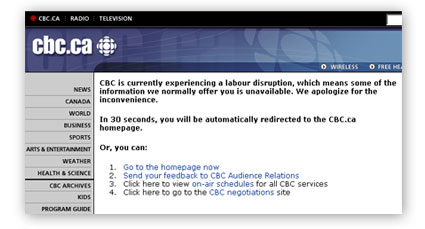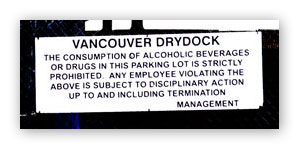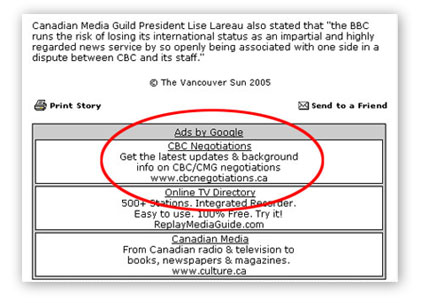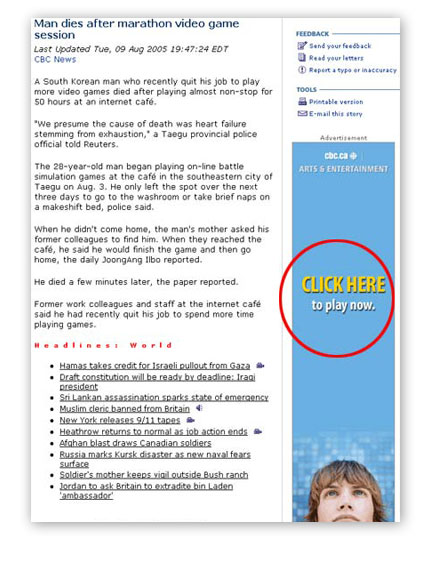We’re Not 404 – We’re Just Experiencing Labour Difficulties

The lock-out at CBC is sparking lots of discussion in our family and with acquaintances.
I don’t rely on CBC for my news, information or entertainment, so the lockout is really just on my periphery. But my business partner Emma Payne was supposed to be a guest on the local call-in show here in Vancouver today, so we’re a bit bummed about things being shut down.
I should be clear about my past experience at CBC: I worked at CBC on contract for over 20 years, and in the last few years was involved in labour negotiations, not as a labour specialist but as a content specialist. I chose not to renew my contract last year, and have since gone into partnership with Emma Payne at At Large Media in Vancouver BC
You’d think that in this day and age there would be better ways to settle things. You’d think that a company that is considered one of Canada’s top 100 employers could find a better way to deal with their employees.

I wonder how long they get to keep the title given that most of their staff
are locked out. Maybe it’s like world wrestling and they have to
defend their ‘top employers’ belt in a no-holds-barred grudge match.
I realize that labour agreements are complex, but when you get right down to it, these are among the most creative and interesting jobs around. Before Canada’s video game industry grew to the size it is today, jobs in radio and TV were THEY dream job for a lot of young creative Canadians. Even though I disagree with some of their direction, and regardless of what you think of the CBC in general, it has a long history of creating some awesome stuff.
The main issues, at least according to what both sides are saying publicly, are life-work balance and contracting out. 70 percent of CBC’s employees are vested staffers who essentially have a job for as long as they choose to stay there, or extreme bumping rights if they get laid-off, or as has been done in the past, extremely lucrative buy-out packages for early retirement. Any way you look at it, this is a tremendous luxury in this day and age, and you can understand why the union is fighting to hang on to it. But at what cost ?
Then there is “life-work balance”. There are no employees at CBC who work more than 37 1/4 hours a week without getting overtime or time off in lieu. Have a think on that. These aren’t heavy lifting hours pulling trash cans off the street or laying brick or even hauling mail from door door through sleet, snow, ice and canines. These are office hours, spent in pretty nice offices, with modern equipment, doing ultra cool work. They may be intellectually grueling hours, but still…
According to a study by the National Sleep Foundation, the average employed American works a 46-hour work week; 38% of the respondents in their study worked more than 50 hours per week. In Canada, work weeks have been trending steadily downward, and those CBC folks are clocking about 4 more hours a week than is the average in Canada. By comparison, the average doctor in BC works a 50 hour work week – that’s before teaching or being on-call. Workers in Norway and the Netherlands work the least number of hours (according to the OECD) and you can see how relaxed they are.
But you don’t have to go too far afield to find some comparisons that are more salient. Take the video game industry. Here are some highlights:
34.3% of developers expect to leave the industry within 5 years, and 51.2% within 10 years.
Only 3.4% said that their coworkers averaged 10 or more years of experience.
Crunch time is omnipresent, during which respondents work 65 to 80 hours a week (35.2%). The average crunch work week exceeds 80 hours (13%). Overtime is often uncompensated (46.8%).
44% of developers claim they could use more people or special skills on their projects.
Spouses are likely to respond that “You work too much…” (61.5%); “You are always stressed out.” (43.5%); “You don’t make enough money.” (35.6%).
Contrary to expectations, more people said that games were only one of many career options for them (34%) than said games were their only choice (32%).
This is taken from a study by the IDGA – you can get your own copy at
http://www.igda.org/qol/whitepaper.php
The point is, work-life/life-work balance is relative – it means one thing if you’re at the CBC and another if you’re at game company and another if you’re picking berries in the Fraser Valley.
The folks who are outside the CBC buildings across the country are highly skilled workers. They do world class work, win countless awards every year, and make pretty good stuff in any given day. By all accounts they are plugged-in and up-to-date with what’s going on in the world. After all, they work for a Canadian media giant, and they got to where they are because they’re the best at what they do. They’re high acheivers, at the top of their game, with loads of options. I’d hope that they could figure out how to manage their own work-life balance issues. And I realize that no-one’s talking about salaries in this dispute, and don’t get me wrong, I think they should get paid really well for the work they do, but if you’re interesting, you can see how those 37 1/4 hours get compensated – the salary scales are here.
Oh, then there’s that permanent staff issue. But I’m the last person who should be commenting on that. I’m such a goof that in my 20-plus years at CBC, the last thing I wanted was to become permanent staff. I far prefered being on contract (which by the way comes with a salary premium at CBC, so you actually take home more money if you’re on contract) so I could decide my own fate rather than have one assigned to me.
if you’re wondering about the labour dispute and want to read what both sides have to say, visit www.cmg.ca and www.cbcnegotiations.ca . And Tod Maffin is been keeping a running commentary on his blog.




















